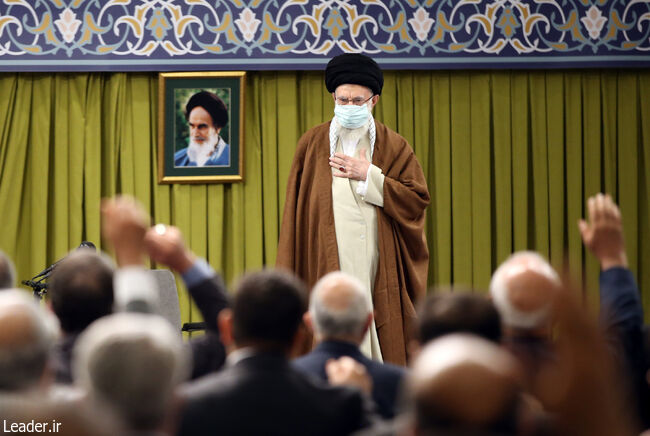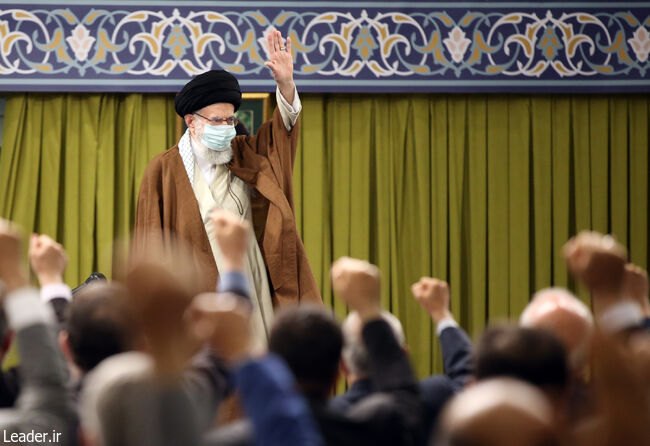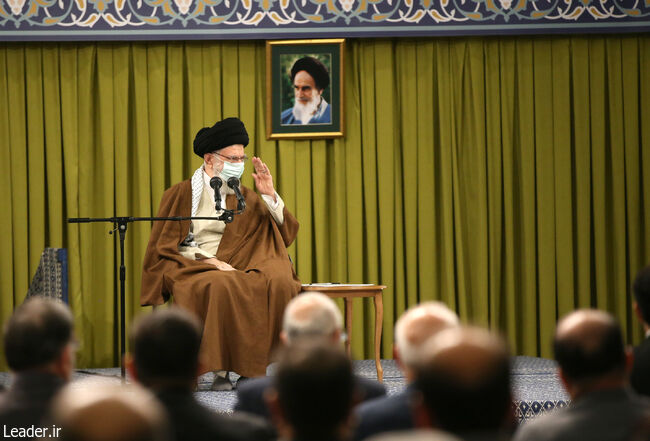On Wednesday morning, the Leader of the Islamic Revolution met with the speaker and members of the 11th Majlis – the Iranian Parliament. He described the 11th Majlis as being, on the whole revolutionary, young, and proactive. He also added that the bills passed by the Majlis to deal with the country's problems as generally fine. Explaining the requirements for Legislation, including "not being influenced by the atmosphere of the time and factional considerations," he stated that "in the final year of the Majlis, important steps were taken. They included examining and ratifying the Seventh National Development Plan, passing the Legislation needed to achieve the slogan of the year, which was controlling inflation and growth in production, and examining and ratifying unfinished bills proposed by the executive or members of Majlis through constant efforts."
As reported by the public relations department of the Leader's office, at the beginning of his speech on the occasion of the 3rd of Khordad (the 24th of May, 1982), the anniversary of the liberation of the city of Khorramshahr from Iraqi occupation, the Leader congratulated the Iranian nation on this miraculous epic and advised the Iranian people to read the books written on Military Operation Beyt al-Moghaddas which resulted in the recapture of the city. He added that "more important than this great victory were the initiatives and war plans for this operation which are worthy of being taught in war colleges, the sacrifices and acts of great gallantry which were beyond average human ability, great martyrs, and other facts that should not be allowed to fade from memory."
Applauding the excellent standing of Majlis, he said that its function of Legislation was far more critical than its duty to oversee the other branches of government. He referred to the vital role of Legislation in "creating stability," "building a predictable future for the individual and society," and "affording the authorities the chance to plan for the future of the country." He added that Legislation is like laying railway tracks or, more accurately, "building roads," which will then determine the path taken by other branches of the government. One of the important points that the Leader referred to was the relationship between the general policies of the Iranian political system and the question of Legislation. In explaining the relationship, he said that the former is applicable to all management styles and methods setting out the general direction of travel, while Legislation sets out the routes that help move in those general directions.
Ayatollah Khamenei said it was absolutely essential that all Legislation passed be in line with the general policies of the Iranian political system. He said, "Legislation has methods and principles which have been handed down to authorities as part of the state's general policies, but have unfortunately not been passed into law although several years have come and gone.
Invoking the general policies governing the formatting of Legislation, he said that "interpretability and clarity," "being solid, consistent, and based on comprehensive expertise," are necessary characteristics for all Legislation. He said that "a good law is one which is easy to implement. Otherwise, it would be like impossible wishes which never come through."
Ayatollah Khamenei said that another requirement of good laws is that they should remain in force for long periods and not be subject to frequent amendments. They should also be clear and not be in conflict with other laws. With respect to the "dos and don'ts" of Legislation, he said that it is essential not to allow laws to accumulate because too many laws to do with an issue cause a quandary. As it has often been said, lawyers who seek to break the law abuse these loopholes for their illegitimate ends.
He said one of the scourges of Legislation is the passing of laws meant to serve the interests of a specific person or group. He went on to add that "the bills put forth by the executive should have priority over the bills proposed by members of the Majlis because when the former proposes a bill, it pays heed to whether it is practical."
He also said another scourge of lawmaking is the process of enacting laws "under the influence of enemies' propaganda." He added that "factional considerations and interests should play no role in evaluating and approving bills."
He went on to say that because of differences in style, there have always been factions in parliaments. Still, we must not allow Majlis to be so polarized that factional interests eclipse justice and expediency in lawmaking.
Summing up this segment of his speech, Ayatollah Khamenei urged Majlis Members to "enact laws to please God and serve divine interests. He said that if this were the case, then God the Almighty would bless these laws."
The second part of the Leader of the Islamic Revolution speech was devoted to the characteristics and performance of the 11th Majlis. He said, "After the passage of three years, I still consider this Parliament to be revolutionary, young, and dynamic. Of course, this is a general view that does not consider possible exceptions."
Identifying the country's problems and passing Legislation to solve them was another characteristic that Ayatollah Khamenei attributed to current Majlis Members. He said most laws passed to fight corruption, eliminate discrimination and monopoly, and improve the business environment have been approved "with decisiveness and clarity."
Ayatollah Khamenei considered some of the bills approved by the current Parliament as strategic and said that "the Strategic Action Plan to lift sanctions was a fundamental and important step that saved the country from a state of a quandary regarding the nuclear issue. We can even see the results of implementing it globally."
The Leader described the Family Protection and Young Population Act as very important while underlining that the knowledge-based production leap law is one of the Majlis' strategic enactments.
The Leader said that he regarded "having a simple life, avoiding aristocratic behaviour, and looking down on people" as the characteristics of many of the members of the 11th Majlis. Although, he said, there were some exceptions.
He strongly urged Majlis Members to safeguard the trait of "mixing with ordinary people and to show humility towards them." He said this is not the same as making promises to the public that they knew were not practical.
He described the last year of the current Majlis' term as being sensitive. He went on to say that "one of the country's problems is to do with the last year of the Majlis because the MPs are up for reelection and are under the watchful eyes of the people. But try to do your work without paying attention to reelection when the polls are held in March. What remains for eternity is working in a way that would attract divine satisfaction."
In his final recommendation to the MPs, the Leader emphasized wrapping up major projects in the Majlis, such as the Seventh National Development Plan, following up on the slogan of the year, finalizing unfinished bills, and making up for shortcomings. Addressing the MPs, he said, "You entered the Parliament with pride and, God willing, will leave it with pride."



